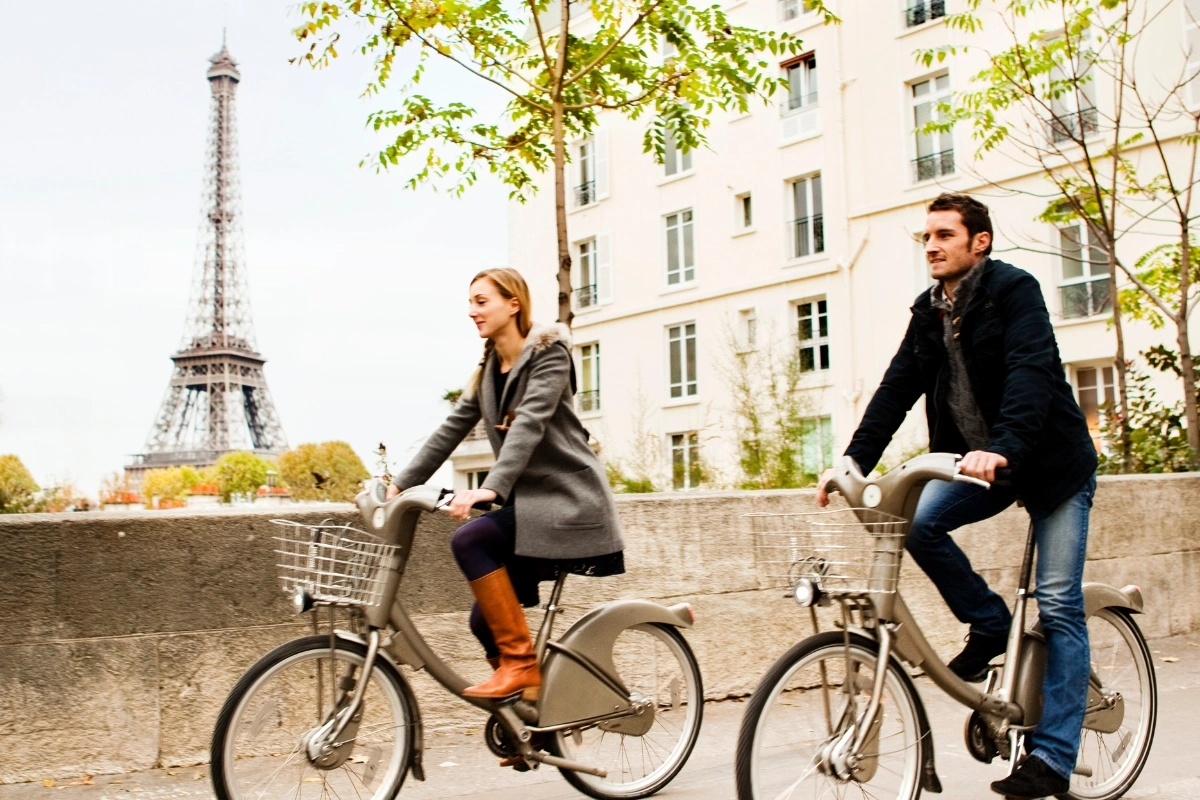Getting around France: A Complete Guide to Transportation

Table of contents:
Key takeaways:
- French transport network: Very dense and diversified, with 866.1 billion passenger kilometres in 2021. The car is used by 84% of passengers, followed by rail (10%) and public transport (3%).
- Rail: The SNCF network includes TGV, TER, Intercité and RER trains, with prices varying according to the route (Paris-Lyon between €25 and €45). It is advisable to book in advance to take advantage of the best deals.
- Motorway network and car-sharing: France has 12,379 km of motorways, most of them under concession. Car-sharing via platforms such as Blablacar is an economical alternative for long-distance journeys.
- Urban transport: Metro, tram, bus and self-service bicycle hire are popular options in major cities. Fares range from €1.50 to €2.50, and bikes can be free for 30 minutes.
- Taxis and VTCs: Apps such as Uber, Bolt, and Lyft are common for quick journeys in cities such as Paris, Lyon, and Marseille. Prices vary according to distance; for example, a trip from Paris to Paris-CDG costs around €50-60.
The Railway Network
With 6.5 million journeys made each day by bus, tram, or metro, public transport is widely used in France.
The railway network, mainly operated by SNCF, is divided into several categories:
-
TGV: High-Speed Trains connecting major French cities such as Paris, Lyon, Bordeaux, Strasbourg, and Nantes.
-
TER: Regional Express Trains serving local areas.
-
Intercités: Trains connecting medium-sized towns and cities.
-
RER: Regional Express Network trains operating in the Île-de-France (Paris area).
Average SNCF ticket prices for trips from Paris are:
-
Paris – Bordeaux: between €25 and €50 for a 2h30 journey.
-
Paris – Lyon: between €25 and €45 for a 2-hour journey.
-
Paris – Lille: between €10 and €20 for a 1h10 journey.
Be sure to book your tickets in advance to get the lowest prices. If you're staying in France for several months, consider getting a OUIGO subscription for discounts on train travel.
The Highway Network
France has an extensive motorway network covering the entire country. As of 2023, it included 12,379 km of motorways, 75.5% of which operate under concession agreements. The main concessionaires managing and maintaining these motorways include Vinci Autoroutes, APRR, and SANEF.
French people often prefer using their personal vehicles, and in 2021, an average of 28,000 vehicles used the highways daily, 84% of which were cars.
Carpooling
Several carpooling platforms, such as Blablacar, allow you to travel long distances at lower costs. It's an ideal solution to save money and meet new people.
Car Rental
If you prefer full autonomy, you can rent a vehicle through one of the many rental companies in France.
To rent a car, you must:
-
Be at least 21 years old;
-
Have held a valid driver's license for at least 1–2 years;
-
Have a credit card in your name to pay the security deposit.
The average rental price for a small car ranges from €30 to €60. As with train tickets, booking in advance often gets you better rates. While basic insurance is included by default, you can opt for additional coverage for more peace of mind.
It’s usually possible to pick up and return the car in different cities, making this a flexible option for exploring the French countryside at your own pace.
Getting Around the City
For getting around in cities, consider using public transport or renting an electric bike to make your journeys easier.
Public Transport
In major cities like Paris, Lyon, Marseille, or Toulouse, you’ll find a wide variety of public transport options:
-
Metro: The fastest way to travel long distances within the city. A single metro ticket in Paris currently costs €2.50. In Lyon, it’s €2.10. In Toulouse and Bordeaux, a ticket costs €1.80.
-
Tramway: Most cities such as Dijon, Lyon, Nantes, or Bordeaux have their own tram networks. Fares generally range from €1.50 to €2.
-
Bus: Expect to pay between €1.50 and €2 for a bus ride, depending on the city. If you plan to use the bus multiple times, consider buying a 10-trip ticket for a discount.
Reserve your currency online
Enjoy the best exchange rates and 0% commission when booking your travel money online.
Bike-Sharing Services
The most eco-friendly transportation option, self-service bikes are available in most major French cities, such as Vélib’ in Paris, Vélo’v in Lyon, and Bicloo in Nantes.
Perfect for short trips or transfers, these bikes are often free for the first 30 minutes. A great way to explore the city!
Taxis and Ride-Hailing Services
Taxi and ride-hailing apps are very popular in France, especially in larger cities. You can use Uber, Bolt, Lyft, or Heetch.
Cities where you can easily book a ride include:
-
Paris
-
Lyon
-
Bordeaux
-
Toulouse
-
Nice
-
Lille
-
Nantes
-
And more
Whether you need a quick trip across Paris or a ride to Toulouse Blagnac Airport, this mode of transport is ideal for last-minute or late-night travel. Airports typically have designated pick-up zones for taxis and ride-hailing vehicles, so finding a driver is easy.
In smaller French towns, service availability may be more limited, but local taxi or VTC companies are usually accessible online.
As a general guide:
-
A trip from Charles de Gaulle Airport to Paris costs around €50–€60.
-
A ride from the Eiffel Tower to Gare de Lyon costs between €15 and €20.
-
In Toulouse, expect to pay about €25–€30 for a journey between Gare Matabiau and Toulouse Blagnac Airport.
France's transportation network is highly versatile, offering a wide range of travel options. It continues to evolve every year, with ongoing improvements such as the expansion of cycling lanes.
Whether you’re taking the TGV, hopping in a carpool, or cycling through Paris, traveling around France will feel effortless. You now have everything you need to explore the country like a local!
-
How to read an exchange rates table?
July 4, 2025
-
4 Food Destinations to Explore in Thailand
June 30, 2025
-
Transport in Asia
July 21, 2025

















